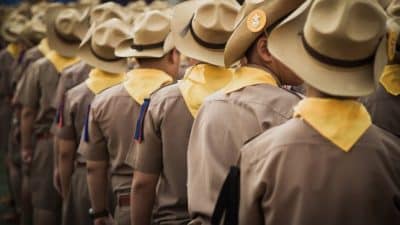Story by Chris Graham
Bill Bolling has learned to live life on the go.
“I will not leave here tonight without my Polish-sausage sandwich and my candy apple,” said Bolling, the Republican Party lieutenant-governor nominee, standing at the front gate of the Rockbridge County Fair in Lexington Wednesday night.
So he has eating on the fly down pat. He also has adjusted his sleep patterns to the schedule of a candidate who is on the road six and even seven days a week.
“You learn to sleep in the car. You get yourself a nice little neck pillow and learn to take catnaps along the way. It’s fine,” Bolling told The Augusta Free Press.“You get used to it. It’s a style of life,” Bolling said of the campaign trail.
The Henrico County state senator has been traveling the Commonwealth’s highways and byways for the better part of the last two years – from the day that he entered the race for the second job in Virginia government.
He calls it “retail politics” – selling his candidacy and his record to the voters one handshake at a time.
“Virginia’s a big state, and if you want to do the kind of retail politics we do, getting out and meeting people, there’s a lot of people to meet. There’s 7 million people in Virginia. And I plan on shaking 6,999,999 hands. I’ll pass up Leslie Byrne, but other than that, I’ll hit everybody else,” Bolling said.
Bolling’s staunch-conservative politics – he opposes tax increases and gay marriage, and supports “the culture of life,” as he terms it – serves him well on the county-fair circuit, in particular.
But it’s not as much about reaching out to the base for Bolling as it is about the chance to meet and greet moderates and independents, he said.
“If you want people to vote for you in November, you’ve got to spend time letting them get to know you in July and August,” Bolling said. “When people go to the polls in November, they’ll say, ‘Yeah, I heard about that guy.’ And now they can say, ‘I met that guy at the Rockbridge County Fair.’ It makes a difference.
“I think it’s important to be able to meet folks like that one on one,” Bolling said. “That’s what we did in the primary. We spent a lot of time on retail politics, getting around to every Republican pig-pickin’ barbecue fish-fry shrimp-feast oyster-roast clam-bake ham-dinner we could get to. You just meet people, and then when people go to the polls, they remember.”
The summer before a general election is also time to raise money for the fall. At first glance, Bolling wouldn’t appear to have to be too focused on the money race with Byrne, the Democratic Party nominee – given that he has raised just a sliver under $1.7 million to Byrne’s $520,000.
But Bolling’s spirited nomination race with Sean Connaughton proved to be costly, and he entered July with $62,671 on hand, roughly half of what Byrne had in the bank at the beginning of the month.
“We’re spending a lot of time raising money, because as you get into the fall, you’ve got to have the money to get your message out. And to get that message out in November, you’ve got to raise a lot of money in July and August,” Bolling said.
Which means that Bolling is out and about somewhere in the Old Dominion “pretty much every day” – meeting voters, attending fund-raisers, whatever the itinerary calls for.
Not that he seems to mind.
“Virginia is a great place. This reemphasizes that,” Bolling said. “We’ve got the nation’s capital in Northern Virginia. We’ve got the beauty of Virginia Beach and the Chesapeake Bay and Eastern Virginia. The mountains are my favorite. I grew up in the mountains. I live in Richmond now, but I miss the mountains. The Shenandoah Valley, the New River Valley, the Roanoke Valley, that’s like home to me. Southside is unique. Southwest is unique. Every part of Virginia is different.
“That’s one thing you get from this. But most important, you learn what’s on people’s minds. You learn the issues that they’re concerned about and what they’re interested in,” Bolling said.
“That’s important in a campaign, because we want to talk about issues that matter to people. We can sit in Richmond and think we know what the issues are, but you don’t really know what the issues are until you get out and meet folks in their backyard and talk to them and ask what’s on their minds,” Bolling said.










